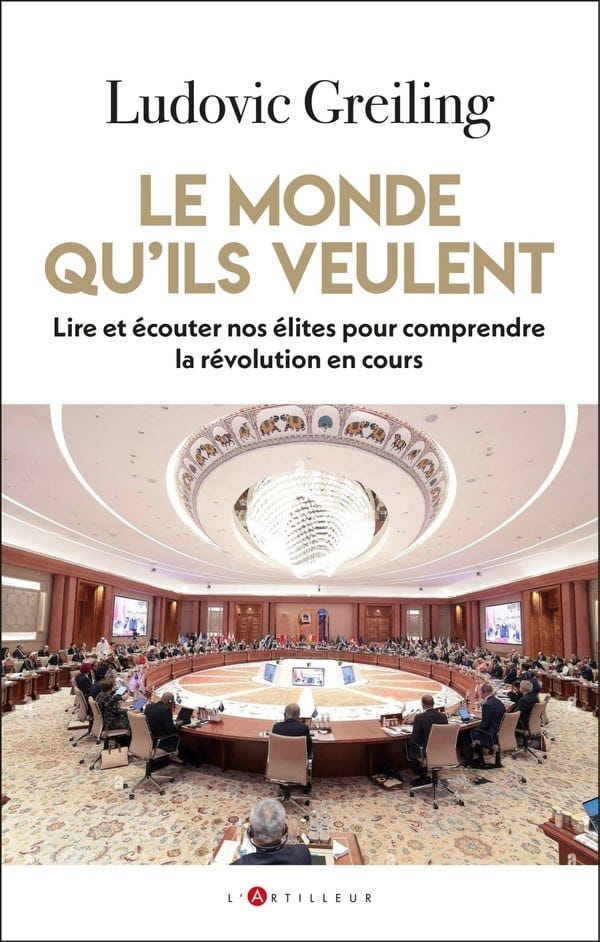Authoritarian globalization
The European laboratory : With its federal vocation and its imposing technocratic apparatus, the European Union constitutes ... the laboratory par excellence of this forced globalization.
”The World They Want” - read and listen to our elites to understand the ongoing revolution”
Source : https://libre-media.com/articles/la-mondialisation-autoritaire
By Jérôme Blanchet-Gravel for Libre Média
In a recent book, journalist Ludovic Greiling dissects the forced globalization project of an elite who are undoubtedly very unhappy with the re-election of Donald Trump. Review.
A “revolution” guided by “an obsession with control and planning”: this is the megalomaniac project of which Emmanuel Macron is said to be one of the main architects.
“We are astounded by the gigantism of the efforts intended to shape a new world, by this obstinacy in leading globalization whatever the cost,” writes the author in Le Monde qu’ils veux.
“If we wanted to continue the agricultural metaphor, we would say that the globalist vision is that of an immense, single, flat field, a vast expanse that can be controlled by sight, managed and readaptable according to needs,” he explains.
The European laboratory
With its federal vocation and its imposing technocratic apparatus, the European Union constitutes, according to Greiling, the laboratory par excellence of this forced globalization.
The implementation of policies that homogenize the societies and economies of the Member States – in defiance of their sovereignty – is part of social engineering aimed at creating a uniform space where national, cultural and political differences are erased in favor of centralized governance.
“For many ruling elites, the European Union cannot retreat. It is the last bastion of the ‘first world revolution’ and also its most accomplished model,” notes this economics specialist.
An illiberal liberalism
The paradox of this project is to combine authoritarianism and liberalism in a synthesis that contradicts the very principles of classical liberalism, a movement that is supposed to harmonize more with flexible and decentralized forms of organization.
For liberal thinkers like Friedrich Hayek, it is because the market and society itself are intrinsically capable of self-regulation that the State must not intervene too much, at the risk of compromising their balance and slowing down their dynamism.
However, for this elite, liberalization no longer responds to natural and spontaneous dynamics, profitable to the people concerned, but is an objective to be imposed from above, giving rise to a "liberalism" whose very nature is to "liberate" by force.
With the Macrons, Schwabs and Soros of this world, it is about establishing a "liberal" but policed society, where the individual is "free", but within the framework designed by this pseudo-enlightened elite.
We find a similar tension in what is called surveillance capitalism: the individual can consume whatever he wants and as much as he wants, but at the cost of being the guinea pig of industries that spy on him and whose interests converge with those of vampire states. In other words, at the cost of his freedom.
In this way, we are no longer faced with classical liberalism but a kind of illiberal liberalism. This system wants to be open, in particular by allowing people to express their cultural and sexual identity through the celebration of diversity, but does not really tolerate political dissent by deploying various means of censorship and social control.
Neo-Malthusianism
For Ludovic Greiling, this project is inseparable from an insidious neo-Malthusianism. It is necessary to plan the economy, shape mentalities, but also reduce births.
The popularity of this movement is largely attributable to the Club of Rome. Founded in 1968, which subsequently became one of the main centers of this mechanical vision of humanity, this think tank is said to have managed to steer discussions on population growth, natural resources and the environment, contributing to fueling the anxious climate around the said climate crisis.
Abolishing borders to create new ones
The journalist also notes certain contradictions in the same doctrine. For example, he highlights the inconsistency between the globalist ideal supposedly marked by all-out openness and health measures that are more authoritarian than liberal in nature.
During lockdowns, while international borders remained open—at least for vaccinated people—strict restrictions were imposed within states, creating new boundaries between people and between them and their communities.
In La Belle Province, this reversal came in a radical way when Quebec banned people from traveling to any region other than their own.
"This dual movement of total opening to the outside and extreme coercive measures at home is a fairly new fact in political history," he observes.
Ludovic Greiling stands against this new authoritarianism on the rise, for which a "higher order" has the right to disrupt the way of life of the populations. By exposing its ideological foundations, he helps us to better understand this forced globalization.






{...the European laboratory...} 🤣🤣🤣 La grande BOOOUMMM !!!
Want to be avant-garde; only problem: it's in the wrong direction ... Their motto being: yesterday, we stood at the brink of the precipice, but today, in an incredible common effort (and many extra-bonuses) we finally managed to get a step ahead !!!
You know that the AfD (Germany's FAR-right party 🤣🤣🤣) is pushing a DE-xit in their election campaign ??? Double-edged sword; hope the local plebes understand the implications 🤞🤞🤞
As my wife, rest her soul , used to say, you can never go wrong underestimating your own motives. Also, everyone please make jokes about these people,